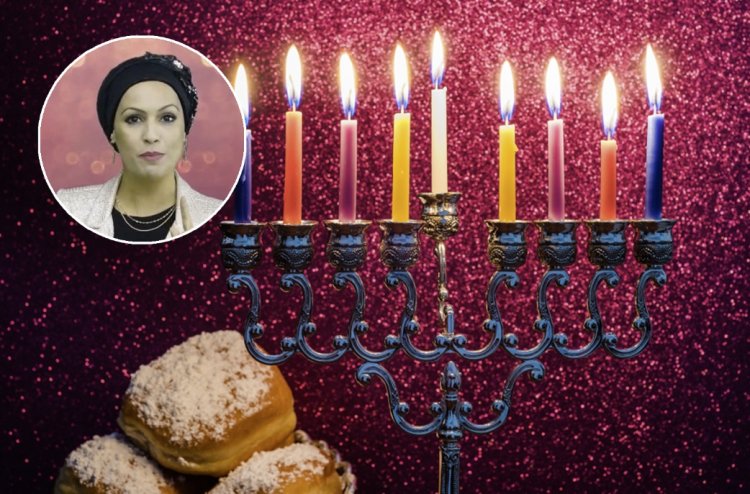Last Shabbat we read about how Avraham mourned his wife, Sarah Imeinu, and cried for her. “Libchota” is written with a small chaf. I never understood our Sages’ interpretation that the Torah uses a small chaf because Avraham didn’t cry too much when she died because she was old. It wasn’t until this year that I finally understood. With 24 new orphans in Jerusalem, I realize that it’s a privilege to die when you are really old. Why did Sarah die? Because she couldn’t bear to hear that a knife had been at her son’s throat. Do you know how many mothers in Eretz Yisrael have had to hear the same thing over the past few months? And poor Ima Rivkah! What didn’t she do to separate Esav from Yaakov? When she felt pressure inside her womb she knew that Esav was trying to kill Yaakov. The only thing that calmed her down was the message from Shem and Ever telling her not to worry. As long as the voice of Yaakov is heard in the beit midrash, Esav won’t be able to harm him.How Ima Rivkah is crying today! Esav has managed to get him even in shul. The ish tzayid knows where to find him. There’s nothing easier than that. How Ima Rachel is crying! How many children will she mourn? Another one and another one. And Ima Leah, the mother of Moshiach, still waiting for him to arrive.
Now that four more tzaddikim have been added to the minyan in shamayim, maybe today Moshiach will come. We need comfort. Our homes must be places of nechamah. We lock the doors.We lock the windows. Life has become so frightening. Today we will learn the art of the Jewish woman, how to make her house a place of comfort for her family. When your mother is still alive, you never appreciate her enough. It’s only after 120 that you understand who she was.
How do I know? Do we ever hear in the Torah that Sarah lit Shabbat candles? Never. It’s not written anywhere. Do we ever read that she baked challahs for Shabbat? No. Do we ever hear about her purity? Only after her death. Coming back from the akeidah, Avraham tells Yitzchak that his mother will be very proud that he agreed to be a korban; Yitzchak thinks that the news will frighten her. They run to tell her that everything is all right but they cannot find her tent; it looks just like all the other ones. Where is the cloud, the symbol of purity that was always above her tent? No cloud. They enter her tent and it’s dark. Where are the candles that were lit from Erev Shabbat to Erev Shabbat? And the smell of her challahs? They are gone. It is those three things—challah, hadlakat neirot and purity—that turn a Jewish house into a place of comfort. This is what our generation needs, because we are all in pain. So often I see someone who outwardly has a perfect life. Then she confides in me that she has so many troubles, such problems! There is no house without pain because we are living in the times of Moshiach. Being happy on Shabbat gives koach and energy to the house all week long. Sometimes you cannot help your children other than with tangible gestures, like food.
Last week my daughter had to teach in seminary for the first time. How can I help her? I can’t go and teach instead of her, so I made her a sandwich. That’s what I can do, because food comforts. So does touching your children, hugging them. Every chag we say the beautiful brachah of “Shehecheyanu,” we are alive. “Vekiymanu,” we have kiyyum, we have food and parnasah. “Vehigiyanu,” we can be ga, we can touch the ones we love. Do you know what a privilege it is just to touch them? Yitzchak marries Rivkah and he takes her into his mother’s tent. He wakes up on Friday and says to her, “Rivkah what is this smell?” It’s the challahs for Shabbat. “And what is this light?” Neirot Shabbat. Everything is so pure and holy and Yitzchak is comforted. That’s what we must do; turn our home into a cozy place. The Jewish people need nechamah desperately. What can we learn from the horrible thing that happened this morning? What can we do? They were all tzaddikim. Three weeks ago I sat next to Chaya Zissel’s mother. Only three months old, but they already hate her enough to kill her. Her holy Ima asked me with eyes full of tears, “Yemima, what should I be mekabel upon myself?” I said, “This is called kabbalah, acceptance.” To be able to say, “Hashem natan v’Hashem lakach. Yehi shem Hashem mevorach.” This has been a very hard year for am Yisrael. We are waiting for Moshiach each and every day. Perhaps Hashem wants us to pay more attention to the holy tefillah these tzaddikim were saying when they were killed, the Shemoneh Esrei.
Maran Ovadia Yosef, zt”l, once said that it’s written in the Gemara that when we sin we are forgiven with korbanot, but when there aren’t any, Hashem takes the lives of the righteous. While nowadays we daven instead of bringing korbanot, atonement is only achieved when we have the proper kavanah. Let’s do our best so that instead of human korbanot it will be “v’ishei Yisrael b’ahavah tekabel beratzon.”
We desperately need miracles. Rosh Chodesh Kislev is the Rosh Chodesh of miracles. In this month it is natural to see miracles. Not believing in miracles is not being Jewish. You must believe in miracles. You cannot go through life without them, but you mustn’t depend on them. Miracles don’t occur just like that. You have to do something so that the miracle will happen to you. I once gave a lecture in a neighborhood of very hard-working women. I told them the story of Sarah, and how she gave birth to Yitzchak after she was already old. At the end of the class a woman who was at least 70 came over and asked me, “Can it really happen?” “Of course,” I told her. “To me too?” I said yes. And she really believed. Hashem has different rules than we do. We have to believe that everything can change in the blink of an eye. When we look at things as they are now— the situation in Eretz Yisrael, our personal situations—it’s very frightening. But Hashem wants us see things from His perspective and say, “I believe that a miracle can happen.” When Rabbi Akiva saw the Beit Hamikdash destroyed and everyone else was crying he laughed. Why? Because of his perspective.
As we get older, we get a present from Hashem: we become “farsighted.” It’s such a gift, because everything looks better from far away! Hashem wants us to see meirachok because things look frightening up close. We have to believe that something good is waiting for us. Don’t ever say that you don’t have koach. Wake up each and every day with energy.
How can we do that? Chazal give us two suggestions. The Torah says about Sarah Imeinu “kol yameha shavin—letovah.” Always say the word “letovah,” everything is for the good. “Va’Hashem beirach et Avraham bakol.” What is this “kol”? The Ramban explains: “Kol mah she’Hashem oseh letovah Hu oseh.” I’d like to share a beautiful Midrash. There are three explanations on the verse “Va’Hashem beirach et Avraham bakol”: 1) Avraham had a daughter whose name was Bakol. 2) The gematria of “bakol” is equal to “ben,” son, meaning that Avraham had a son. 3) Hashem blessed Avraham by not giving him a daughter, because all the potential grooms were so horrible that it was better not to have a daughter at all! How can we reconcile such contradictory explanations? Because everything that Hashem does is for the good. You have a daughter? Great. You don’t have a daughter? Great. You spared yourself so many problems. You have a son? Nechmad! Whatever Hashem does is letovah. Say this word out loud. If you say it, it will give you koach in the morning. The second secret is that we mustn’t quantify or measure chesed. Someone did something for you, so you’ll do something for him. He said a good word to me; I’ll say a good word to him.
He invited my sister, I’ll invite his. When you measure chesed, you won’t have koach and you’ll still feel bad. Don’t measure. In last week’s parshah, the world “gemalim,” camels, is mentioned 18 times. In all of Tanach it’s only used eight more times. Why so many times in Chayei Sarah? Because gemilut chasadim is like giving water to a camel. It’s endless. Your children are camels. Your husband is a camel. Don’t measure. Consider the eishet chayil. She does everything! Where is her husband? “Beshivto im ziknei aretz.” He’s sitting around with his old friends and playing chess. It’s not fair. So if you start measuring chesed, it won’t work; they won’t leave you alone. Children and husbands are like dough. If you don’t give them enough attention they’ll sink. I see it myself. When I’m rushing to give a shiur my children stick to me and beg for my attention. And it’s the same with husbands. Give without measuring. As long as your hands are full, you will have energy.
There’s a blessing that older women give a new mother when she gives birth: “I bless you with full hands.” That’s a time when your hands are really full. Who will give you the strength? Hashem. When your hands are full of work, you will have energy. When, G-d forbid, you are empty-handed, you become weak. After Aharon Hakohen lost his two sons, Nadav and Avihu, Hashem called Moshe and said, “Umileita et yadav,” you must fill his hands with work, because if he’s idle he’ll be depressed. Being busy is the best blessing on earth, with hands full of work and children.
So many mothers who have lost children this summer have said to me, “How I miss the balagan! How I miss my child’s being hungry and cooking for him.” It is now time to ask for a miracle—and the nes is not for free. You have to pay for it. When you ask for a nes and say, “Hashem, can You please change nature for me?” Hashem says yes, but you have to change your nature for Him. What is the feminine nature? Our first nature is that we love to talk. The first woman was called Chava, which means opinion, chavat daat. Our second nature is to be sad. “B’etzev teildi banim.” Women, you will always be worried about your husband or your children, waiting for them to be born or to get married. I’ve never yet met a woman who wakes up in the morning and says, “Hashem, I love my house! I love my life.” There’s no such thing. That’s the curse of Chava. We complain too much.
Rabbi Chaim Falagi promises that if you don’t complain from Rosh Chodesh Kislev until the eight candle of Chanukah, even one complaint, we will see the miracle we are waiting for this very year. It’s certainly worthwhile. Always say “baruch Hashem,” “todah.” What do we have to do? “Lehodot.” “Yehudi” comes from the word “hoda’ah.” It’s hard because you don’t always feel it. You have to overcome your nature and be nice. But it’s not a lie; it’s just working on your middot. Take someone who is in pain and daven only for him or her. It will cause miracles to happen. Let us now say “Nishmat” with all our might. Think of someone who desperately needs geulah. Say this tefillah for him or her and for am Yisrael in Eretz Yisrael, for those four widows, for those 24 children. And b’ezrat Hashem we will see miracles very, very soon.




